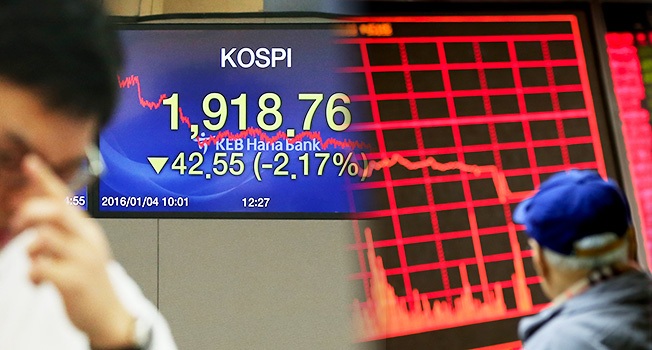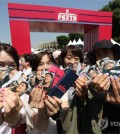- California Assembly OKs highest minimum wage in nation
- S. Korea unveils first graphic cigarette warnings
- US joins with South Korea, Japan in bid to deter North Korea
- LPGA golfer Chun In-gee finally back in action
- S. Korea won’t be top seed in final World Cup qualification round
- US men’s soccer misses 2nd straight Olympics
- US back on track in qualifying with 4-0 win over Guatemala
- High-intensity workout injuries spawn cottage industry
- CDC expands range of Zika mosquitoes into parts of Northeast
- Who knew? ‘The Walking Dead’ is helping families connect
Seoul, China, Tokyo stocks plunge

Stock indexes in Seoul (left), Beijing (right) and Tokyo (not shown) nosedived Monday, on growing concerns over the weakening Chinese economy. In Seoul, the benchmark KOSPI plunged 2.2 percent on the first trading day of the year to a four-month low of 1918.76, affected by a nearly 7 percent plunge in China and anticipations of weaker-than-expected Samsung Electronics 4Q earnings results due out Friday. (Yonhap / AP)
By Choi Kyong-ae
Korean, Chinese and Japanese stocks fell sharply across the board Monday on growing concerns about the economic slowdown in China and weakening oil prices amid escalating regional conflict in the Middle East, analysts said.
The benchmark KOSPI fell 2.2 percent to 1,918.76 points on the first trading day of the year, hit by plunges in Chinese stocks and expectations of weaker-than-expected Samsung Electronics earnings.
Foreigners were massive sellers on the Seoul bourse. The won also fell sharply against the dollar, ending at 1,187.70 won against the greenback, down 15.2 won from the previous session’s close.
The Shanghai Composite tumbled 6.85 percent to 3,296.66 points, and the Nikkei lost 2.7 percent to 18,518.60.
Analysts say the Seoul stock market will remain weak throughout the first quarter as major Korean exporters such as Samsung Electronics and Hyundai Motor Group were likely to post disappointing earnings results for last year.
Foreigners and institutional investors sold about 150 billion won ($126 million) worth of shares, pulling down the KOSPI index. Their net selling came after the Chinese stock market fell nearly 7 percent.
“If Samsung Electronics disappoints the market with its fourth-quarter and full-year results (due out Jan. 8), the index may fall below the psychologically important 1900 level to the lower end of 1800,” said KR Futures strategist Seo Sang-young.
Seo said China’s stock plunge was also a core factor that weighed down on Korean shares. Massive stock selling in China took place days before the government’s temporary ban on net selling by large shareholders to avoid another stock crash.
The Caixin Purchasing Managers’ Index (PMI) came in weaker than expected.
The manufacturing PMI fell to 48.2 in December, from 48.6 a month earlier, contracting for a 10th straight month.
Last but not the least, worsening exports remain a major headache for the stock market, with Korea’s exports tumbling 13.8 percent to $42.6 billion year-on-year, according to the Ministry of Trade, Industry and Energy.
For the whole of 2015, exports fell 7.9 percent to $527.2 billion from a year earlier.
“Low oil prices and slowing demand from China will continue to have a negative impact on Korean shipments this year. There is no way out for the time being,” said HI Investment & Securities analyst Park Sang-hyun.
He expected the KOSPI could fall to 1850 if here was no meaningful rebound in consumer sentiment this year.
Major exporters ended lower Monday. Bellwether Samsung Electronics fell 4.4 percent to 1.2 million won, with Hyundai Motor down 3.4 percent at 144,000 won and SK Innovation down 3.1 percent at 126,000 won.
















